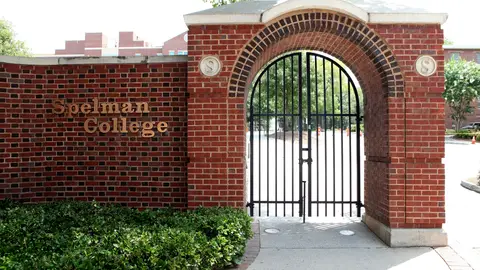Courtesy of Spelman College
Spelman College announced a $5 million grant from the William and Flora Hewlett Foundation. The grant is one of four from the Foundation totaling more than $20 million to academic institutions that historically serve diverse student populations to support the launch and expansion of interdisciplinary cyber policy programs.
The grants, which reflect the foundation’s commitment to increasing equity and diversity within the cyber field, will support new cyber policy programs at Tallahassee’s Florida A&M University and Spelman College in Atlanta, two historically Black institutions; Florida International University in Miami, a Hispanic-serving institution, and Turtle Mountain Community College, a tribal college in Belcourt, North Dakota.
Launched in early 2014, the 10-year, $150 million Cyber Initiative’s goal has been to cultivate a field of institutions with experts capable of addressing society’s most pressing cyber challenges, from encryption policy to combating ransomware to establishing norms governing conflict between nations in cyberspace, among others.
“Because of the pivotal role digital technology plays in our society, it is critical that the cybersecurity field that protects computer networks and individual users can draw on the experience and expertise of people from diverse backgrounds – particularly those that have historically been underrepresented and excluded,” said Eli Sugarman, who leads the Cyber Initiative for the Hewlett Foundation. “The work these institutions will do represents a key piece of the puzzle in the development of a more diverse cyber policy field that can keep us all safer in cyberspace.”
To ensure that the cyber policy field benefits from the perspectives of people from diverse backgrounds working in relevant disciplines, the Hewlett Foundation has supported efforts such as fellowship and training programs, support for scholars, and research on the issue. These efforts are intended to increase the talent pipeline of students and leaders from diverse communities and opportunities for cyber policy scholarship that is interdisciplinary, spanning fields from computer science to law. Sugarman described these large grants as a “capstone” to those efforts.
Spelman will use the new grant to develop an interdisciplinary cyber program through a collaboration between the Computer and Information Sciences and Political Science departments at the school. The grant will enable Spelman to increase the number of Black women in the cyber field through the creation of an interdisciplinary minor in cyber policy, host an annual speaker series on cyber issues, and develop a pathway program for Spelman students to complete graduate degrees in cyber policy at a partner school.
“The Computer and Information Sciences and Political Science departments at Spelman College provide a competitive academic environment where scholars who are dedicated to changing the world through community and innovation explore opportunities in computing, applied science, policy, and research. This grant will enable Spelman to expand its traditional computer science and political science degree program offerings to include an interdisciplinary program in cybersecurity policy that explores and creates an understanding of cyber technology, its impact on society, the challenges of securing such systems, and how evolving technologies shape policies, as well as the impact of policy on cyber,” said Dr. Raquel Hill, professor and chair of the computer and information sciences department at Spelman, “This initiative will provide a foundation in cyber policy for all undergraduates, regardless of major, and will prepare them to pursue advanced degrees in cyber policy at select partner institutions.”





